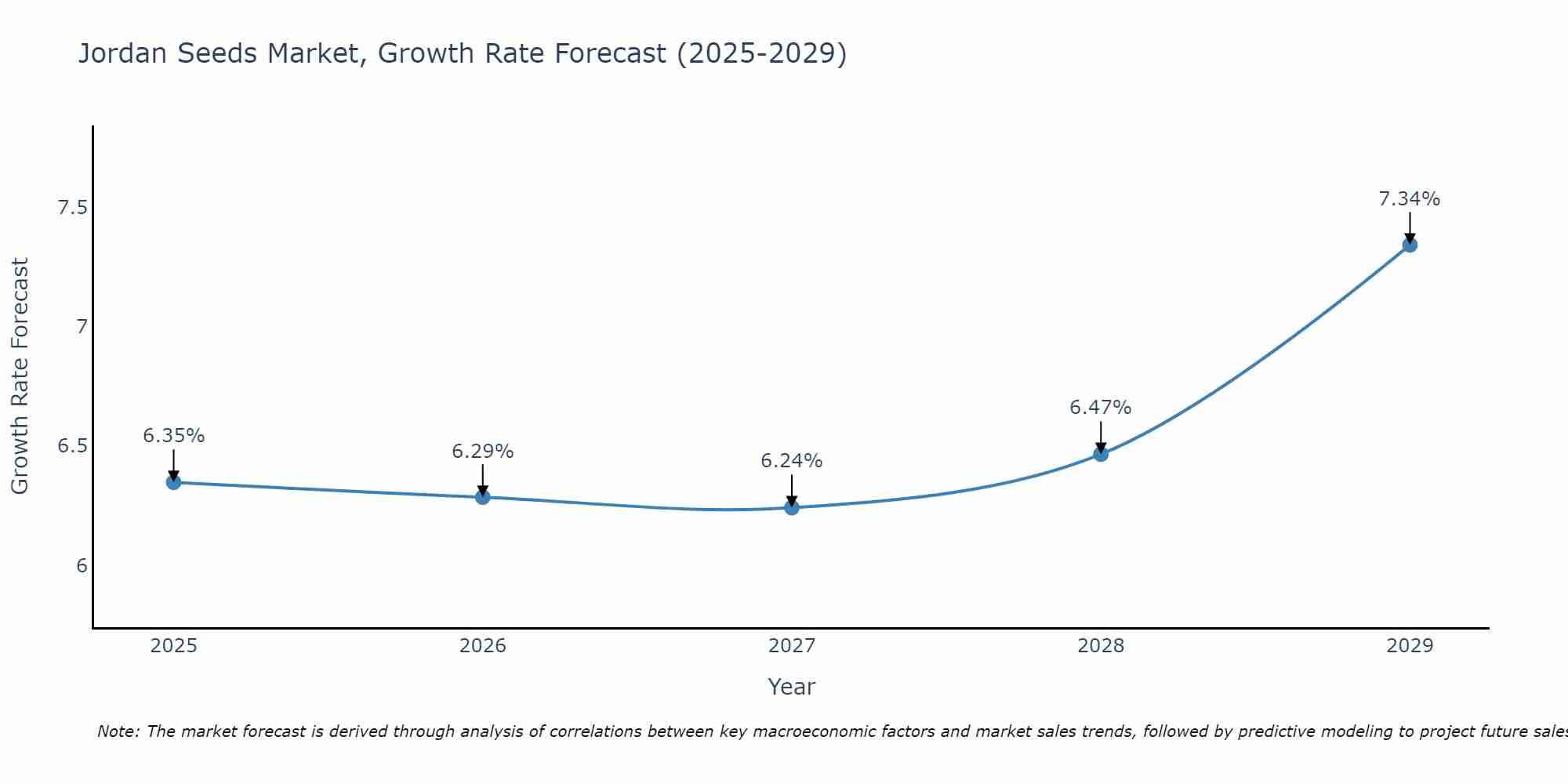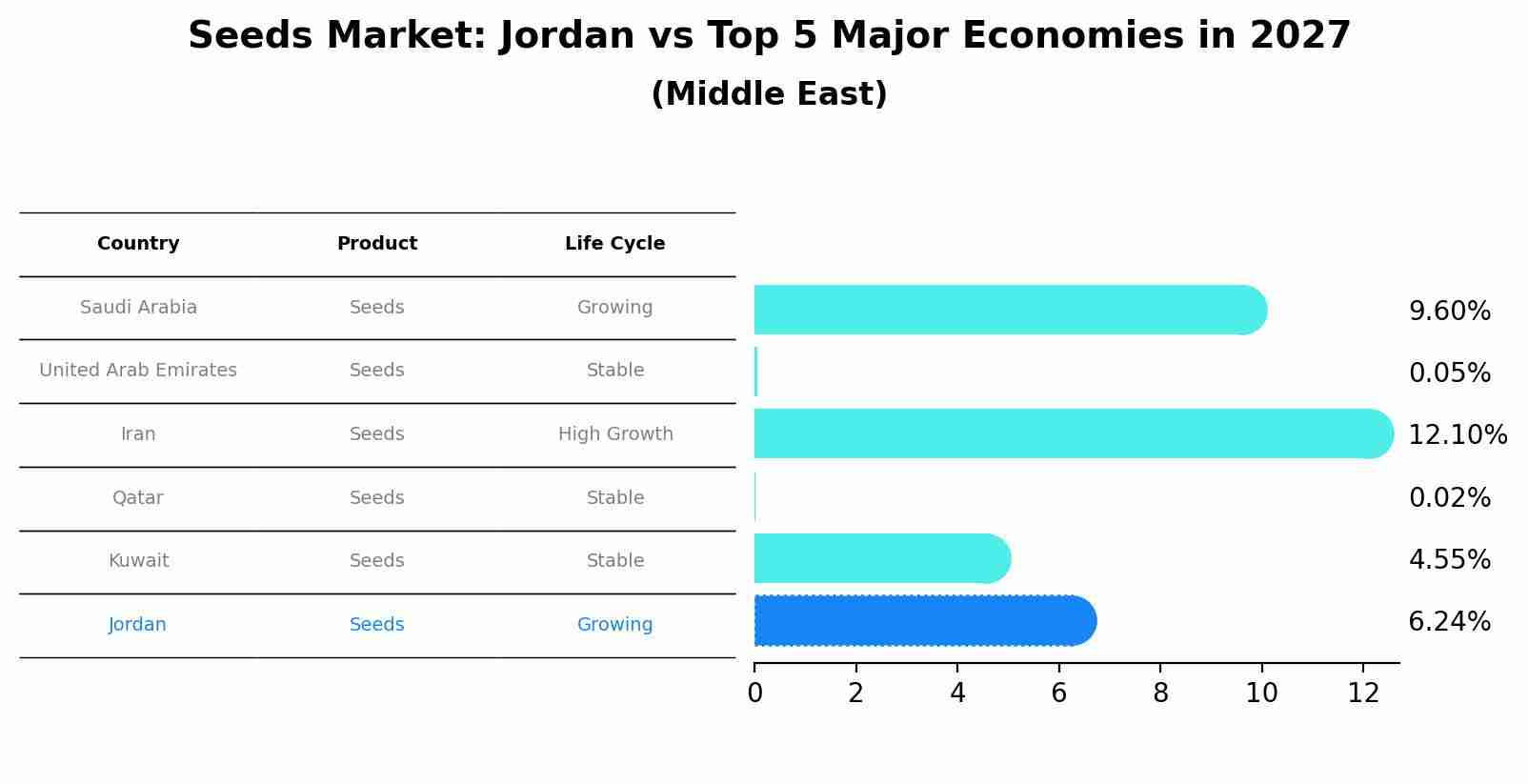Jordan Seeds Market Outlook | Share, Size, Revenue, Companies, Growth, Trends, COVID-19 IMPACT, Value, Forecast, Analysis & Industry
| Product Code: ETC384706 | Publication Date: Aug 2022 | Updated Date: Jul 2025 | Product Type: Market Research Report | |
| Publisher: 6Wresearch | Author: Dhaval Chaurasia | No. of Pages: 75 | No. of Figures: 35 | No. of Tables: 20 |
Jordan Seeds Market Size Growth Rate
The Jordan Seeds Market is projected to witness mixed growth rate patterns during 2025 to 2029. The growth rate starts at 6.35% in 2025 and reaches 7.34% by 2029.

Seeds Market: Jordan vs Top 5 Major Economies in 2027 (Middle East)
By 2027, Jordan's Seeds market is forecasted to achieve a growing growth rate of 6.24%, with Saudi Arabia leading the Middle East region, followed by United Arab Emirates, Iran, Qatar and Kuwait.

Jordan Seeds Market Synopsis
The Jordan seeds market is a thriving industry characterized by a diverse range of seeds including grains, vegetables, and fruits. The market is driven by factors such as increasing demand for high-quality agricultural produce, growing awareness about the benefits of using certified seeds, and government initiatives to promote modern farming techniques. Key players in the market include local seed companies, international seed suppliers, and government agricultural agencies. Farmers in Jordan are increasingly adopting hybrid and genetically modified seeds to improve crop yields and resilience to environmental challenges. The market is also witnessing a trend towards organic and non-GMO seeds, reflecting consumer preferences for healthy and sustainable food choices. Overall, the Jordan seeds market presents opportunities for growth and innovation in the agricultural sector.
Jordan Seeds Market Trends
The Jordan Seeds Market is witnessing several key trends, including a growing demand for hybrid and genetically modified seeds that offer higher yields and better resistance to pests and diseases. Farmers are increasingly looking for seeds that can withstand environmental challenges such as drought and extreme temperatures. There is also a rising interest in organic and non-GMO seeds, driven by consumer demand for healthier and more sustainable food options. Additionally, digitalization is playing a significant role in the market, with the adoption of precision agriculture techniques and seed technologies to optimize crop production. Collaboration between seed companies and research institutions is also on the rise to develop innovative seed varieties tailored to the specific needs of Jordanian farmers.
Jordan Seeds Market Challenges
In the Jordan Seeds Market, several challenges are faced that impact the industry`s growth and competitiveness. One significant challenge is the limited access to high-quality seeds and technology, leading to lower crop yields and reduced agricultural productivity. Additionally, the lack of awareness and adoption of modern farming practices among smallholder farmers hinders the demand for improved seeds. Infrastructure issues such as inadequate storage facilities and transportation also pose challenges in ensuring seed quality and timely delivery to farmers. Furthermore, regulatory barriers and inconsistent policies related to seed production and distribution create uncertainties for market players. Overcoming these challenges will require investment in research and development, capacity building programs for farmers, and streamlined regulations to promote a more sustainable and efficient seeds market in Jordan.
Jordan Seeds Market Investment Opportunities
In the Jordan Seeds Market, there are several investment opportunities for both domestic and international investors. With a growing demand for high-quality seeds due to the expansion of agriculture in the region, investing in seed production and distribution companies can be lucrative. Additionally, there is potential for investment in seed research and development to create genetically modified seeds that are tailored to the specific needs of Jordanian farmers, such as drought-resistant or high-yield varieties. Furthermore, investing in agricultural technology companies that provide innovative solutions for seed treatment, crop monitoring, and precision farming can also be a promising opportunity in the Jordan Seeds Market. Overall, the market offers a range of investment options for those looking to capitalize on the increasing demand for advanced seeds and agricultural technologies in Jordan.
Jordan Agar Market Government Policies
The Jordanian government has implemented several key policies to regulate the seeds market in the country. These policies include the Seeds Law, which aims to ensure the quality, safety, and effectiveness of seeds produced and distributed in Jordan. The law mandates registration and certification of seed varieties to guarantee their authenticity and performance. Additionally, the government promotes research and development in the seed sector to enhance innovation and productivity. Import and export regulations are also in place to control the movement of seeds across borders and protect local producers. Overall, these policies work towards maintaining quality standards, supporting the growth of the seeds market, and safeguarding the interests of farmers and consumers in Jordan.
Jordan Seeds Market Future Outlook
The Jordan Seeds Market is expected to witness steady growth in the coming years driven by factors such as increasing demand for high-quality seeds in the agriculture sector, advancements in seed technologies, and a growing focus on sustainable farming practices. The market is likely to benefit from the government`s initiatives to promote modern farming techniques and improve crop yields. Additionally, the rising trend of home gardening and urban farming is anticipated to create new opportunities for seed suppliers in Jordan. However, challenges such as water scarcity, climate change, and changing consumer preferences towards organic and non-GMO seeds may impact the market dynamics. Overall, the Jordan Seeds Market is poised for expansion, with companies focusing on innovation and product diversification to stay competitive in the evolving agricultural landscape.
Key Highlights of the Report:
- Jordan Seeds Market Outlook
- Market Size of Jordan Seeds Market, 2021
- Forecast of Jordan Seeds Market, 2031
- Historical Data and Forecast of Jordan Seeds Revenues & Volume for the Period 2018 - 2031
- Jordan Seeds Market Trend Evolution
- Jordan Seeds Market Drivers and Challenges
- Jordan Seeds Price Trends
- Jordan Seeds Porter's Five Forces
- Jordan Seeds Industry Life Cycle
- Historical Data and Forecast of Jordan Seeds Market Revenues & Volume By Type for the Period 2018 - 2031
- Historical Data and Forecast of Jordan Seeds Market Revenues & Volume By Genetically Modified (GM) Seed for the Period 2018 - 2031
- Historical Data and Forecast of Jordan Seeds Market Revenues & Volume By Conventional Seed for the Period 2018 - 2031
- Historical Data and Forecast of Jordan Seeds Market Revenues & Volume By Crop for the Period 2018 - 2031
- Historical Data and Forecast of Jordan Seeds Market Revenues & Volume By Field Crops for the Period 2018 - 2031
- Historical Data and Forecast of Jordan Seeds Market Revenues & Volume By Fruit & Vegetable Crops for the Period 2018 - 2031
- Historical Data and Forecast of Jordan Seeds Market Revenues & Volume By Availability for the Period 2018 - 2031
- Historical Data and Forecast of Jordan Seeds Market Revenues & Volume By Commercial Seeds for the Period 2018 - 2031
- Historical Data and Forecast of Jordan Seeds Market Revenues & Volume By Saved Seeds for the Period 2018 - 2031
- Historical Data and Forecast of Jordan Seeds Market Revenues & Volume By Seed Treatment for the Period 2018 - 2031
- Historical Data and Forecast of Jordan Seeds Market Revenues & Volume By Treated for the Period 2018 - 2031
- Historical Data and Forecast of Jordan Seeds Market Revenues & Volume By Untreated for the Period 2018 - 2031
- Historical Data and Forecast of Jordan Seeds Market Revenues & Volume By Seed Trait for the Period 2018 - 2031
- Historical Data and Forecast of Jordan Seeds Market Revenues & Volume By Herbicide Tolerant for the Period 2018 - 2031
- Historical Data and Forecast of Jordan Seeds Market Revenues & Volume By Insecticide Resistant for the Period 2018 - 2031
- Historical Data and Forecast of Jordan Seeds Market Revenues & Volume By Other Stacked Traits for the Period 2018 - 2031
- Jordan Seeds Import Export Trade Statistics
- Market Opportunity Assessment By Type
- Market Opportunity Assessment By Crop
- Market Opportunity Assessment By Availability
- Market Opportunity Assessment By Seed Treatment
- Market Opportunity Assessment By Seed Trait
- Jordan Seeds Top Companies Market Share
- Jordan Seeds Competitive Benchmarking By Technical and Operational Parameters
- Jordan Seeds Company Profiles
- Jordan Seeds Key Strategic Recommendations
Frequently Asked Questions About the Market Study (FAQs):
- Single User License$ 1,995
- Department License$ 2,400
- Site License$ 3,120
- Global License$ 3,795
Search
Thought Leadership and Analyst Meet
Our Clients
Related Reports
- Canada Oil and Gas Market (2026-2032) | Share, Segmentation, Value, Industry, Trends, Forecast, Analysis, Size & Revenue, Growth, Competitive Landscape, Outlook, Companies
- Germany Breakfast Food Market (2026-2032) | Industry, Share, Growth, Size, Companies, Value, Analysis, Revenue, Trends, Forecast & Outlook
- Australia Briquette Market (2025-2031) | Growth, Size, Revenue, Forecast, Analysis, Trends, Value, Share, Industry & Companies
- Vietnam System Integrator Market (2025-2031) | Size, Companies, Analysis, Industry, Value, Forecast, Growth, Trends, Revenue & Share
- ASEAN and Thailand Brain Health Supplements Market (2025-2031) | Strategy, Consumer Insights, Analysis, Investment Trends, Opportunities, Growth, Size, Share, Industry, Revenue, Segments, Value, Segmentation, Supply, Forecast, Restraints, Outlook, Competition, Drivers, Trends, Demand, Pricing Analysis, Competitive, Strategic Insights, Companies, Challenges
- ASEAN Bearings Market (2025-2031) | Strategy, Consumer Insights, Analysis, Investment Trends, Opportunities, Growth, Size, Share, Industry, Revenue, Segments, Value, Segmentation, Supply, Forecast, Restraints, Outlook, Competition, Drivers, Trends, Demand, Pricing Analysis, Competitive, Strategic Insights, Companies, Challenges
- Europe Flooring Market (2025-2031) | Outlook, Share, Industry, Trends, Forecast, Companies, Revenue, Size, Analysis, Growth & Value
- Saudi Arabia Manlift Market (2025-2031) | Outlook, Size, Growth, Trends, Companies, Industry, Revenue, Value, Share, Forecast & Analysis
- Uganda Excavator, Crane, and Wheel Loaders Market (2025-2031) | Strategy, Consumer Insights, Analysis, Investment Trends, Opportunities, Growth, Size, Share, Industry, Revenue, Segments, Value, Segmentation, Supply, Forecast, Restraints, Outlook, Competition, Drivers, Trends, Demand, Pricing Analysis, Competitive, Strategic Insights, Companies, Challenges
- Rwanda Excavator, Crane, and Wheel Loaders Market (2025-2031) | Strategy, Consumer Insights, Analysis, Investment Trends, Opportunities, Growth, Size, Share, Industry, Revenue, Segments, Value, Segmentation, Supply, Forecast, Restraints, Outlook, Competition, Drivers, Trends, Demand, Pricing Analysis, Competitive, Strategic Insights, Companies, Challenges
Industry Events and Analyst Meet
Whitepaper
- Middle East & Africa Commercial Security Market Click here to view more.
- Middle East & Africa Fire Safety Systems & Equipment Market Click here to view more.
- GCC Drone Market Click here to view more.
- Middle East Lighting Fixture Market Click here to view more.
- GCC Physical & Perimeter Security Market Click here to view more.
6WResearch In News
- Doha a strategic location for EV manufacturing hub: IPA Qatar
- Demand for luxury TVs surging in the GCC, says Samsung
- Empowering Growth: The Thriving Journey of Bangladesh’s Cable Industry
- Demand for luxury TVs surging in the GCC, says Samsung
- Video call with a traditional healer? Once unthinkable, it’s now common in South Africa
- Intelligent Buildings To Smooth GCC’s Path To Net Zero


















